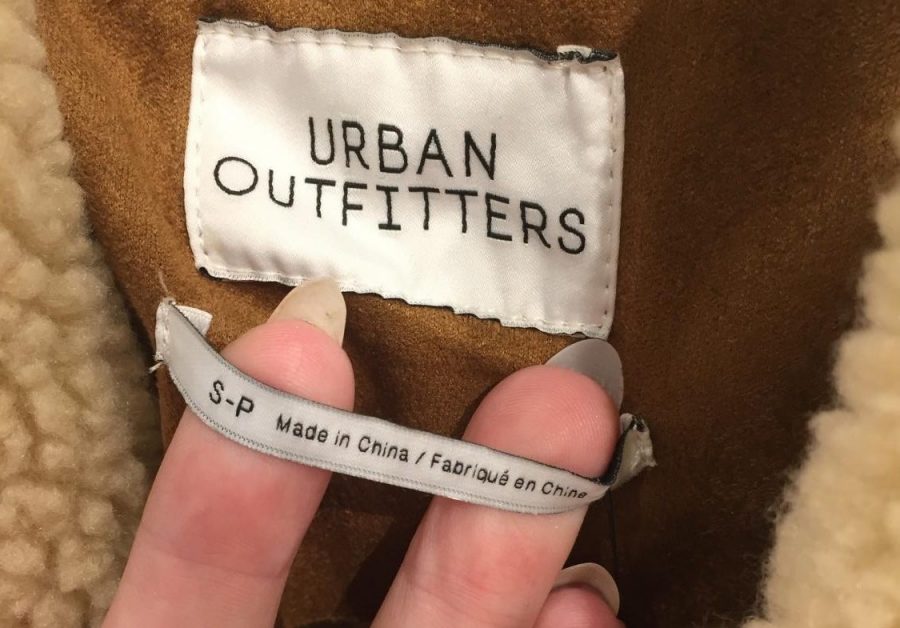Problems Plaguing Fast Fashion
October 25, 2018
Have you ever wondered why a t-shirt from a fast fashion company costs far less than a t-shirt from a fashion house? Besides the quality of materials used in the product, the price will depend on the source. Fast fashion takes advantage of consumers naïveté and never prides themselves on the ethical nature or quality of their clothing.
Depending on where and how something is made can affect the price point a consumer sees, which presents a major problem. An average family can not afford to dress ethically in a capitalist society. Working and middle-class Americans must turn to reliable alternatives at reasonable prices such as ASOS, Forever 21, Gap, and many more fast fashion companies that provide trendy, affordable clothing. These alternatives are efficient and cost-effective for someone on a budget, but they present cons that are not thought about in daily life. When you see a new sweater on a fast fashion website, there is no description of where it is made. As a consumer, this should be the first red flag.
A quality company will always advertise where their clothing is made, and will not exclude information about ethical products because it compliments their reputation and attracts more buyers. As a modern-day consumer, buying ethically needs to be seen as more of a spectrum rather than black and white as the poor are victims and agents of fashion capitalism. For example, impoverished people in the U.S are shamed for having old, unfashionable clothes because it is an automatic clue into their socioeconomic standing, therefore fast fashion, such as Forever 21, is a perfect source.
Fast fashion brands produce thousands of stylish clothes, and dupes for expensive brands, as soon as a look can be designed and made. But behind this heavily covered, never-ending level of production and consumption is the liveliness of other human beings. Fast fashion brands outsource their manufacturing to less developed regions of countries such as China, Sri Lanka, Honduras, India, Myanmar, Vietnam, and even the U.S.
Most of the time, mothers will get roped into sweatshops with the promise of food, money, and a future for their families. Working in the textile industry is often the most savory option these women have to stay alive, so when pay cuts happen two or three times a year, these women have no option to quit. As Natalie Kitroeff and Victoria Kim of the Los Angeles Times reports, “She [Norma Ulloa] spent 11 hours a day… pinning Forever 21 tags on trendy little shirts… on a good day, the 44-year-old could get through 700 shirts.” Ulloa works out of a sweatshop in downtown Los Angeles in order to feed her family of four getting paid as little as $6 an hour — just half of the minimum wage in LA.
Minorities and immigrants are targeted for these positions in factories where safety and fire codes are rarely met or inspected. As the demands for fashion increase by the consumer, companies can afford to pay employees less while having them produce more at a faster rate. This quota must be met by employees because their families lives depend on it.
Even though fast fashion brands are the main culprit of corporate oppression, more expensive brands are still guilty of unethical production, and sometimes sell the exact same clothing at a higher price. Urban Outfitters is a good example of what can be considered quality clothing, though the clothing is made in the same sweatshops as Forever 21. Urban’s clothing is no better quality or anymore ethical, but they make a much larger profit by selling higher end brands within their stores such as Adidas (made in Indonesia), Tommy Hilfiger (made in India), and Calvin Klein (made in Vietnam and Sri Lanka). Even large fashion houses such as Versace, who pride themselves with always making their products in Italy by credited seamstresses, do not use completely ethical means to acquire all of their fur and leather used in their products.
You may feel as though there is nothing you can do to stop this system of oppression, but there is: stop buying from fast fashion companies. Any company that specializes in shipping a large quantity of a trendy product and does not advertise themselves as authentic or ethical is not to be trusted.
A great way to avoid malevolent companies would be buying classic, quality pieces from known ethical companies that will last a long time, or buying from thrift stores. Good companies to buy from include: ABLE (a company dedicated to helping women in poverty-stricken areas of the world), People Tree ( a fair trade company based in the UK), Everlane (a transparent clothing company), Kirrin Finch (a plus size ethical company that sells men’s and women’s clothes), and Hope & Harvest (a plus size ethical company specializing in women’s fashion). Lastly, the best way to shop ethically on a budget is trying out a variety of thrift stores near you. Every thrift store you shop at is completely disconnected from the brands that are found inside a thrift shop, so you can shop securely knowing that every buy will be ethical. Do you know where your shirt came from? Go ahead, check your tag.
